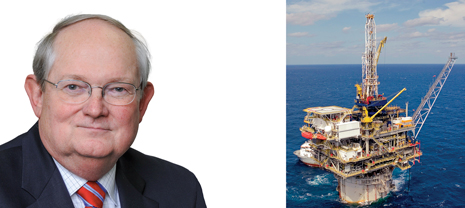Innovative thinkers
Charlie Williams: A life of Technology and safety
|
“Safety first.” That sign and countless others related are everywhere in the petroleum business, and without a doubt, safety is paramount to the industry’s integral success. Over the past four decades, Charlie Williams, executive director at the Center for Offshore Safety (COS), has been at the forefront of safety for the offshore oil and gas industry.
Williams graduated from the University of Tennessee in 1971, with a degree in mechanical engineering, and started working for Shell in New Orleans as a production engineer. It was his work in the swamps of Louisiana in the 1970s that provided a background of inspiration for technology and safety. “I spent a lot of time in the field, seeing how things get done, and that is something that is mostly difficult these days, because most of the action is in deep water,” Williams said. “Engineers design, create and construct, but getting to see them in real life was really fulfilling.” The technology that drives the offshore industry is truly what attracted Williams, and he still marvels and appreciates it to this day. “Seeing [the oil fields] in live action was a real engineering thrill; I enjoyed the technology quest of it, and very much still do.” From the swamps, Williams moved on to more technically challenging well completions in the deepwater Gulf of Mexico. His work proved that commercial production from deep water was not just possible, but could be done safely and reliably. Several decades of offshore operations gave Williams vital experience, and in 2005, Shell’s Mars TLP was damaged badly when Hurricane Katrina hit the Gulf of Mexico. Williams spearheaded its safe, and timely, return to production, ahead of schedule. “I always say I had a feel for safety,” Williams said. “But it was [the Mars repair project] that let me live, and see, those safety management concepts. It was a difficult project.” Among the notable Mars repair accomplishments were lifting the 1,000-ton damaged rig substructure in 3,000 ft of water, and recording 1.2 million man-hours without a single recordable injury. “It was a great example of how to make safety management work, and an inspiring project overall,” Williams said. “Mars was a great precursor to the work I am doing now.” Following the 2010 Deepwater Horizon accident, Williams worked on the COS board, and upon retirement from Shell, was appointed to the COS helm. “I had a significant amount invested in [the COS].” These days, he finds himself not only laying the groundwork and applying safety codes for the industry’s mandatory regulations, but traveling across the country and speaking about his experience in combining safety and technology. Even back in the 1970s, Williams asked for a better, safer and more efficient way to do things. “It wasn’t just a ‘how can we do this’ approach, but how can it be done safely. The Center for Offshore Safety standards and training are established to ensure that they are done every second of every hour of every day,” Williams said. “All systems must deliver the highest standards, all the time.” Williams chaired the Joint Industry Subsea Well Control and Containment Task Force; served on the Bureau of Safety and Environmental Enforcement’s Offshore Energy Safety Advisory Committee; and was a key leader in establishing the Marine Well Containment Company. Williams, a lifetime SPE member and active API supporter, is one of the recent “Class of 2014” Industry Pioneer inductees at the Offshore Energy Center’s Hall of Fame. At COS, Williams is steadfast in his commitment to all companies—contractors, operators and service companies—sharing concepts, designs and ideas, and stressing a combination of human factors, with reliable and safe practice and execution. “Post-Horizon, the commitment to collaborate and improve is a new era in thinking about safety,” Williams added. |
- Applying ultra-deep LWD resistivity technology successfully in a SAGD operation (May 2019)
- Adoption of wireless intelligent completions advances (May 2019)
- Majors double down as takeaway crunch eases (April 2019)
- What’s new in well logging and formation evaluation (April 2019)
- Qualification of a 20,000-psi subsea BOP: A collaborative approach (February 2019)
- ConocoPhillips’ Greg Leveille sees rapid trajectory of technical advancement continuing (February 2019)



